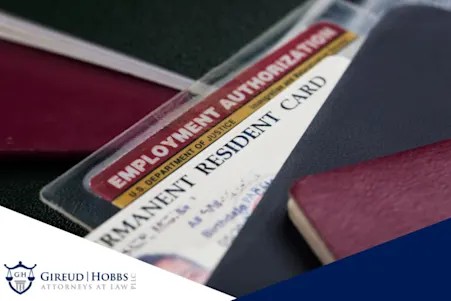Many people are eligible to immigrate to the United States based on their family relationships with U.S. citizens and lawful permanent residents – and if you’re one of them, Alamo Law Group may be able to help you.
Table of Contents
Request A Free Consultation Today!
Request A Free Consultation Today!
Family Immigration in San Antonio
You may be eligible to immigrate to the U.S. if you have a family member who’s a lawful permanent resident or citizen, or who’s a refugee or asylee who has been admitted to the United States within the past two years.
Your relative in the United States must petition the government on your behalf – you can’t petition for yourself. For most people, the best way to approach family immigration is to work with a San Antonio immigration attorney who can help manage the entire process.

Green Cards and Visas for Family Members of Citizens and Lawful Permanent Residents
A green card is a document that proves a person is a lawful permanent resident of the United States; the person identified on the green card can live or work anywhere in the country. A green card is the final step toward naturalization – that’s what it’s called when a foreigner becomes a U.S. citizen.
A visa is a document that allows a person to come to the United States for a specific purpose, such as to get married, to work, or to attend school. If you come to the U.S. on a visa, your stay is temporary. However, in some cases, you can adjust your status from temporary visitor to permanent resident.
Family Members Who Are U.S. Citizens
Some U.S. citizens with foreign family members are allowed to petition the U.S. government for green cards and visas. The chart below shows which immigration benefits U.S. citizens can extend to certain family members.
| Type of Relative of U.S. Citizen | Immigration Benefit |
Spouse Children Parents (but only if the citizen is age 21 or older) Siblings (but only if the citizen is age 21 or older) | Green card for lawful permanent residence |
| Fiancé residing outside the U.S. and the fiancé’s children who are under the age of 21 | Fiancé visa |
Family Members Who Are Lawful Permanent Residents
Lawful permanent residents of the United States (also called green card-holders) can petition the government for lawful permanent residency for spouses and unmarried children of any age.
Request A Free Consultation Today!
Family Members of Asylees and Refugees
If you’re an asylee or refugee in the U.S. and have entered the U.S. within the past 2 years (or you were granted your status in the past 2 years), you may ask the government to give green cards to your spouse and children (provided your children were unmarried and under the age of 21 when you first applied for asylum or refugee status).

Fiancés of U.S. Citizens and Lawful Permanent Residents: Green Card Marriage
Many U.S. citizens and green card holders marry foreigners – and those foreign spouses may be eligible for lawful permanent residency in the U.S. Usually, getting a green card through marriage is a three-step process:
- The U.S. citizen or green card-holder petitions the government for a fiancé visa. However, this step isn’t necessary in all cases. You only need a fiancé visa if you intend to marry in the United States; if you marry outside the United States, you don’t need this type of visa.
- Fill out and file Form I-485 and Form I-130. If one spouse is a U.S. citizen, you can generally file these two forms together. If one spouse is a lawful permanent resident, you must usually wait until a green card is available before you can file the I-485 package.
- Attend a green card interview. Usually, both spouses must be interviewed.
A Word on Military Spouses
Military spouses may qualify for expedited processing, and they’re eligible for permanent residence and citizenship under special provisions of the Immigration and Naturalization Act. These spouses may also be eligible to naturalize outside the United States without traveling to the U.S. if they meet certain criteria.
Immediate Relative Categories in Family Immigration
The U.S. government considers some people to be immediate relatives. Immediate relatives are:
- Spouses of U.S. citizens
- Unmarried children who are under the age of 21 of U.S. citizens
- Orphans adopted abroad by a U.S. citizen
- Orphans to be adopted in the U.S. by a U.S. citizen
- Parents of a U.S. citizen, provided the citizen is at least 21 years old
You must have a U.S. citizen family member to fall into one of these categories. If you or your family member does not fall into one of these categories, they may fall under a family preference category, which is covered in the following section.
In order to petition the government for a green card for an immediate family member:
- A U.S. citizen (or his or her attorney) must file Form I-130, Petition for Alien Relative.
- You must prove a qualifying immediate relative relationship, such as a marriage certificate, birth certificate or adoption certificate
- The beneficiary (the alien relative) must apply for a green card by petitioning for an adjustment of status
- The U.S. citizen must promise to sponsor the family member
- The alien relative must be admissible to the United States
Family Preference Categories in Family Immigration
Family preference categories are for people whose U.S.-based relative is a lawful permanent resident or who fall into a different family relationship with a U.S. citizen. These are the family preference categories:
- This category is for the unmarried, adult children of U.S. citizens, provided that the children are age 21 or over.
- This category is for spouses and unmarried children (if the children are under the age of 21) of permanent residents.
- This category is for unmarried adult children of lawful permanent residents.
- This category is for married children of U.S. citizens (and the children can be any age).
- This category is for siblings of adult U.S. citizens.
Like immediate family members, those who fit into these categories must be admissible to the United States, have their U.S.-based family member petition the government and prove a qualifying family relationship.
Admissibility to the United States
You can only come to the U.S. if you’re admissible; that means you meet certain criteria and don’t threaten the United States in any way. Grounds for inadmissibility are reasons the U.S. government could say that you don’t qualify for admission to the United States. Some grounds for inadmissibility include:
- You must undergo a health examination to establish that you don’t carry diseases that present a public health risk or have a dangerous disorder.
- Previous immigration violations. USCIS will review your immigration history to make sure you’ve never overstayed a visa or entered the U.S. unlawfully, and that you’ve never misused a visa (such as by working when you were only allowed to come for a leisure visit).
- Criminal records. If you have committed aggravated felonies, drug crimes or acts of terrorism in the past, your criminal history may prevent the U.S. from allowing you in.
Do You Need a San Antonio Immigration Lawyer?
If you’re interested in coming to the United States under a family immigration program, we may be able to help you. Our team of attorneys has the experience and knowledge you need to work your way through the immigration process, so call us today to schedule your free consultation.

